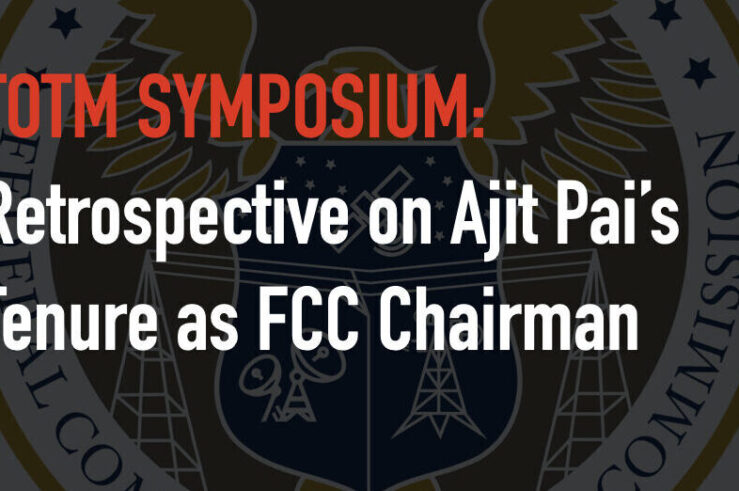Showing archive for: “Spectrum & Wireless”
Great Job, Kid! (And Welcome to the Private Sector)
Many thanks to Geoffrey Manne for this opportunity to memorialize a few thoughts I have about Ajit’s service on the Federal Communications Commission. My remarks will be more about Ajit as a person rather than the substance and long laundry list of his accomplishments as chair. Others will do that, I’m sure. The first memory ... Great Job, Kid! (And Welcome to the Private Sector)
Introductory Post: Retrospective on Ajit Pai’s Tenure as FCC Chairman
Ajit Pai will step down from his position as chairman of the Federal Communications Commission (FCC) effective Jan. 20. Beginning Jan. 15, Truth on the Market will host a symposium exploring Pai’s tenure, with contributions from a range of scholars and practitioners. As we ponder the changes to FCC policy that may arise with the ... Introductory Post: Retrospective on Ajit Pai’s Tenure as FCC Chairman
The DOJ’s Antitrust Case Against Google: A Tough Slog, but Maybe an Intriguing Possibility?
The U.S. Department of Justice’s (DOJ) antitrust case against Google, which was filed in October 2020, will be a tough slog.[1] It is an alleged monopolization (Sherman Act, Sec. 2) case; and monopolization cases are always a tough slog. In this brief essay I will lay out some of the issues in the case and raise ... The DOJ’s Antitrust Case Against Google: A Tough Slog, but Maybe an Intriguing Possibility?
Why the Federal Government’s Antitrust Case Against Google Should—and Likely Will—Fail
On October 20, 2020, the U.S. Department of Justice (DOJ) and eleven states with Republican attorneys general sued Google for monopolizing and attempting to monopolize the markets for general internet search services, search advertising, and “general search text” advertising (i.e., ads that resemble search results). Last week, California joined the lawsuit, making it a bipartisan ... Why the Federal Government’s Antitrust Case Against Google Should—and Likely Will—Fail
Building the Digital Future: Can the EU Foster a Dynamic and Crime-Free Internet?
The European Commission has unveiled draft legislation (the Digital Services Act, or “DSA”) that would overhaul the rules governing the online lives of its citizens. The draft rules are something of a mixed bag. While online markets present important challenges for law enforcement, the DSA would significantly increase the cost of doing business in Europe ... Building the Digital Future: Can the EU Foster a Dynamic and Crime-Free Internet?
Rolled by Rewheel, Redux
The Finnish consultancy Rewheel periodically issues reports using mobile wireless pricing information to make claims about which countries’ markets are competitive and which are not. For example, Rewheel claims Canada and Greece have the “least competitive monthly prices” while the United Kingdom and Finland have the most competitive. Rewheel often claims that the number of ... Rolled by Rewheel, Redux
Antitrustifying Contract: Thoughts on Epic Games v. Apple and Apple v. Qualcomm
In the hands of a wise philosopher-king, the Sherman Act’s hard-to-define prohibitions of “restraints of trade” and “monopolization” are tools that will operate inevitably to advance the public interest in competitive markets. In the hands of real-world litigators, regulators and judges, those same words can operate to advance competitors’ private interests in securing commercial advantages ... Antitrustifying Contract: Thoughts on Epic Games v. Apple and Apple v. Qualcomm
In the Fight Against Qualcomm, Apple’s Loss is Apple’s Gain
Apple’s legal team will be relieved that “you reap what you sow” is just a proverb. After a long-running antitrust battle against Qualcomm unsurprisingly ended in failure, Apple now faces antitrust accusations of its own (most notably from Epic Games). Somewhat paradoxically, this turn of events might cause Apple to see its previous defeat in ... In the Fight Against Qualcomm, Apple’s Loss is Apple’s Gain
Islands of Chaos: The Economic Calculation Problem Inherent in Municipal Broadband
Municipal broadband has been heavily promoted by its advocates as a potential source of competition against Internet service providers (“ISPs”) with market power. Jonathan Sallet argued in Broadband for America’s Future: A Vision for the 2020s, for instance, that municipal broadband has a huge role to play in boosting broadband competition, with attendant lower prices, ... Islands of Chaos: The Economic Calculation Problem Inherent in Municipal Broadband
Will Montesquieu Rescue Antitrust?
In an age of antitrust populism on both ends of the political spectrum, federal and state regulators face considerable pressure to deploy the antitrust laws against firms that have dominant market shares. Yet federal case law makes clear that merely winning the race for a market is an insufficient basis for antitrust liability. Rather, any ... Will Montesquieu Rescue Antitrust?
The Deterioration of Appropriate Remedies in Patent Disputes
Property rights are a pillar of the free market. As Harold Demsetz famously argued, they spur specialization, investment and competition throughout the economy. And the same holds true for intellectual property rights (IPRs). However, despite the many social benefits that have been attributed to intellectual property protection, the past decades have witnessed the birth and ... The Deterioration of Appropriate Remedies in Patent Disputes
On the Origin of Platforms: An Evolutionary Perspective
Hardly a day goes by without news of further competition-related intervention in the digital economy. The past couple of weeks alone have seen the European Commission announce various investigations into Apple’s App Store (here and here), as well as reaffirming its desire to regulate so-called “gatekeeper” platforms. Not to mention the CMA issuing its final ... On the Origin of Platforms: An Evolutionary Perspective








